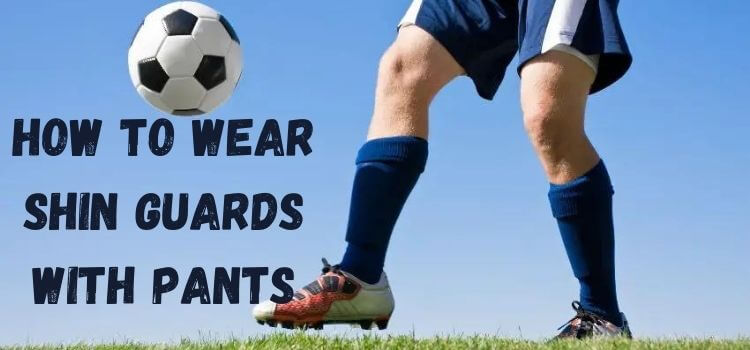As an Amazon Associate, I earn from qualifying purchases
Shin guards are necessary protective equipment for many sports, especially those involving a lot of leg contact, like soccer, field hockey, and martial arts. But wearing shin guards can sometimes be a bit tricky, especially if you prefer to wear them with pants. Let’s explore the best practices for wearing shin guards with pants to ensure you’re both comfortable and well-protected.

Understanding Shin Guards
Types of Shin Guards
Shin guard styles are available, including slip-in shin guards, ankle shin guards, and shin socks. Each kind accommodates a range of tastes and needs by providing varying degrees of comfort and protection.
Materials Used in Shin Guards
Shin guards are typically made from materials like plastic, fiberglass, and foam. These materials provide varying degrees of protection and flexibility. The material you choose will rely on your particular needs and the desired level of effect.
Importance of Proper Fit
Shin guards must be properly fitted to function effectively. If they don’t fit properly, they may provide insufficient protection and cause pain. For this reason, in order to guarantee the best possible performance, you must measure your legs and choose a suitable size.
Choosing the Right Pants
Types of Pants Suitable for Shin Guards
When it comes to pairing shin guards with pants, not all pants are created equal. Athletic pants, compression pants, and loose-fitting sweatpants are generally suitable choices.
The key is to find pants that allow the shin guards to stay in place without restricting your movement.
Material Considerations
Their material dramatically influences the comfort and functionality of your pants. Look for moisture-wicking fabrics that keep you dry and prevent the shin guards from slipping. Breathable materials also help maintain comfort during intense physical activity.
Fit and Comfort
Your pants should fit snugly enough to keep the shin guards in place but not so tight that they cause Discomfort. Ensure there’s enough room for your shin guards without compromising on your range of motion.
Preparation Steps
Measuring Your Legs
Measure your shin from a little below the knee to slightly above the ankle before purchasing shin guards. This measurement can aid in selecting the appropriate size for a good fit.
Selecting the Right Size of Shin Guards
Shin guards come in various sizes, usually indicated by height ranges. Consult the manufacturer’s size chart to choose a size based on your dimensions.
Preparing Your Pants
Make sure your pants are clean and dry before you put on your shin guards. Check that they are not too loose or too tight around the legs where the shin guards will be placed.
Wearing Shin Guards with Loose-Fitting Pants
Step-by-Step Guide
- Put on your socks: Wear your regular socks first.
- Slide in the shin guards: Make sure the shin guards cover the area from just below the knee to above the ankle as you position them over your shins.
- Secure the shin guards: To keep the shin guards in place, use the straps or sleeves.
- Pull up your pants: Carefully pull your pants over the shin guards, ensuring they don’t shift out of place.
Tips for Securing Shin Guards
If necessary, use tape or additional straps to keep the shin guards from moving. Ensure the straps are not too tight to prevent restricting blood flow.
Ensuring Comfort and Mobility
Check your movement by walking around and performing some stretches. Adjust the shin guards if you feel any discomfort.
Wearing Shin Guards with Tight-Fitting Pants
Step-by-Step Guide
- Put on compression pants: Start by wearing your compression pants.
- Position the shin guards: Slide the shin guards under the compression pants.
- Adjust for fit: Make sure the shin guards are positioned correctly and comfortably.
- Secure with socks: Pull your socks over the compression pants and shin guards for additional security.
Tips for Securing Shin Guards
Compression pants often hold shin guards in place better than loose-fitting pants. However, you can use additional straps or tape if needed.
Ensuring Comfort and Mobility
Move around to check the comfort level. Adjust as necessary to ensure the shin guards don’t pinch or cause Discomfort.
Adjusting Shin Guards for Maximum Protection
Positioning the Shin Guards
Shin guards should cover the entire shin area—from just below the knee to above the ankle. They should fit snugly without sliding around.
Securing the Straps
Tighten the straps enough to keep the shin guards in place but not so tight that they cause Discomfort or restrict movement.
Checking for Proper Fit
After securing the shin guards, move around to check for comfort and fit. Please make sure there are no gaps between them and your legs.
Common Mistakes to Avoid
Wearing Shin Guards Too High or Too Low
Incorrect positioning reduces the effectiveness of the shin guards. Ensure they cover the intended area without extending too high or low.
Ignoring Discomfort
If your shin guards cause Discomfort, adjust them immediately. Ignoring Discomfort can lead to injuries.
Not Checking Fit Regularly
Check the fit of your shin guards regularly, especially during breaks in play, to ensure they have stayed the same.
Care and Maintenance of Shin Guards
Cleaning Your Shin Guards
Clean your shin guards after each use to prevent bacteria buildup. Before storing, wash them with gentle soap and water and let them air dry entirely.
Storing Shin Guards Properly
Store your shin guards in a dry, ventilated area. Avoid leaving them in damp environments to prevent mold growth.
Replacing Worn-Out Shin Guards
Shin guards can wear out and lose their protective qualities over time. Make sure to regularly check your shin guards for wear and tear and replace them if necessary.
Conclusion
It can be challenging to wear shin guards with pants, but taking the appropriate precautions can guarantee protection and comfort. Remember to choose pants that fit correctly, secure your shin guards appropriately, and regularly check for a proper fit. Prioritizing these steps will help you stay safe and focused during your game or activity.
FAQs (Frequently Asked Questions)
Properly fitting shin guards should cover the area from just below your knee to above your ankle without slipping or causing Discomfort.
Although it is feasible, it is usually not advised as it may cause Discomfort and decrease efficacy. It’s better to wear them under your pants for a secure fit.
Athletic pants, compression pants, and loose-fitting sweatpants are great options. Look for moisture-wicking and breathable materials.
Every time you see wear and tear indicators on your shin guards, including cracks or diminished cushioning, you should replace them. Performing routine inspections will assist you in determining when to get a new pair.
It’s best to hand wash your shin guards with mild soap and water. Machine washing can damage the materials and reduce their lifespan.
Read Our More Articles
- How High Should Shin Guards Be for Soccer?
- How Should Shin Guards Fit Soccer? The Ultimate Guide
- How to Clean Soccer Shin Guards for Maximum Protection
As an Amazon Associate, I earn from qualifying purchases


